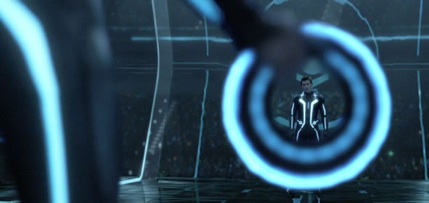I was born the year after Star Wars was released, so for my entire lifetime, the dominant mode in popular cinema has been “heavy on the special effects, the script is a necessary evil, keep the ideas simple.” Careful study of cinema history has revealed that—contrary to what old people claim—it was always thus, it’s just that the special effects in Star Wars (created by a team of Stanley Kubrick’s 2001 guys) were cool enough that the script became even less necessary an evil, and as time went on and effects got even cooler, the script became even more nakedly a framework with which to pace action sequences and explain why the cool stuff looks cool in the particular way it does. While Star Wars kicked off the modern era in terms of “screw the script, doesn’t this look cool?” it’s a Tolstoy novel next to Tron: Legacy.
This is not to say that there’s nothing to Tron: Legacy. It’s a story, it’s got some ideas, it’s marginally more than just an excuse to showcase its visual effects, but really, it’s an excuse to show off visual effects. It, famously (infamously?), ushered in the CGI era in cinema, and did reasonably well at the box office, certainly well enough for a sequel, though curiously it took 28 years for one to arrive.
The sequel, Tron: Legacy, starts off with Jeff Bridges—quite spectacularly de-aged a couple decades—telling his young son about some “miracle” in his work that’s going to change everything. And then he disappears mysteriously. His son grows up to be Garrett Hedlund, who remains the hands-off majority shareholder in Jeff Bridges’ company, which has been taken over by evil white guys; Garrett Hedlund’s total contribution to the company is pranking them elaborately once a year (the one we see involves hacking into the company’s system and uploading pictures of a cute puppy instead of their rebranded crap operating system, thus bizarrely giving Tron: Legacy the honor of having the most realistic hack in recent cinematic history). While a nice little vignette about open source and puppies being good, it has nothing to do with the rest of the movie aside from establishing Garrett Hedlund as the good guy. Because he likes open source software and puppies. This is known as cheating.
Jeff Bridges’ old pal comes to Garrett Hedlund and tells him that he’s heard from Jeff Bridges, and so Garrett Hedlund, puzzled, goes to Jeff Bridges’ old video arcade, and in fairly short order is plunged headfirst into Jeff Bridges’ computer alternate reality world where everything looks really cool and is in 3D, and where Good Jeff Bridges (who talks a lot like a mildly less high version of The Dude from The Big Lebowski) and Bad Jeff Bridges (the trés fasciste perfectionist computer program Good Jeff Bridges created way back in the day) are locked in détente. Garrett Hedlund’s arrival, however, throws everything into turmoil and allows Bad Jeff Bridges the opportunity to march an army of laserbots into reality and take over the world, etc., etc. The usual.
Fortunately the been-there-done-that plot and the occasional bit of dumb dialogue aren’t liabilities to Tron: Legacy. They’re essential elements of this type of picture, for one thing, and for another, good god this picture looks gorgeous. Yes, aside from Olivia Wilde (who, apart from looking stunning in her PG-13 all-black cyberpunk-lite warrior woman outfit, has exasperatingly little to do). The effects are a nice blend of the early-80s vintage aesthetic of the first picture with the types of things only possible with the exponentially greater processing power of modern FX-generating computers.
Tron: Legacy is pure eye candy, so stunning visually that none of the dumb stuff matters, even the incredibly dumb way in which Good and Bad Jeff Bridges settle their differences in the end. Equal to the visuals is the epic, thundering score by French techno gods Daft Punk (who appear in a very funny cameo as white-helmeted DJs spinning at a club run by an unrecognizable, flamboyant Michael Sheen), making the whole picture a very long-form music video with dialogue interludes. And, as Jeff Bridges has been known to say, that’s cool, man.
It must be said, at this point, that hardcore Tron people are likely to enjoy this movie very much. A friend of mine, a big Tron fan, who caught a midnight showing last night said that his delight was borderline pornographic. So I repeat that caveat: hardcore Tron people are likely to get more out of it than just the pretty pictures and good music, but those delights are certainly sufficient for non-initiates who are in the mood for a ride.
[For more on Tron: Legacy, check out Ryan Britt’s post on Tron: Legacy vs. Tron, with spoilers.]
Danny Bowes is a playwright, filmmaker and blogger. He is also a contributor to nytheatre.com and Premiere.com.










